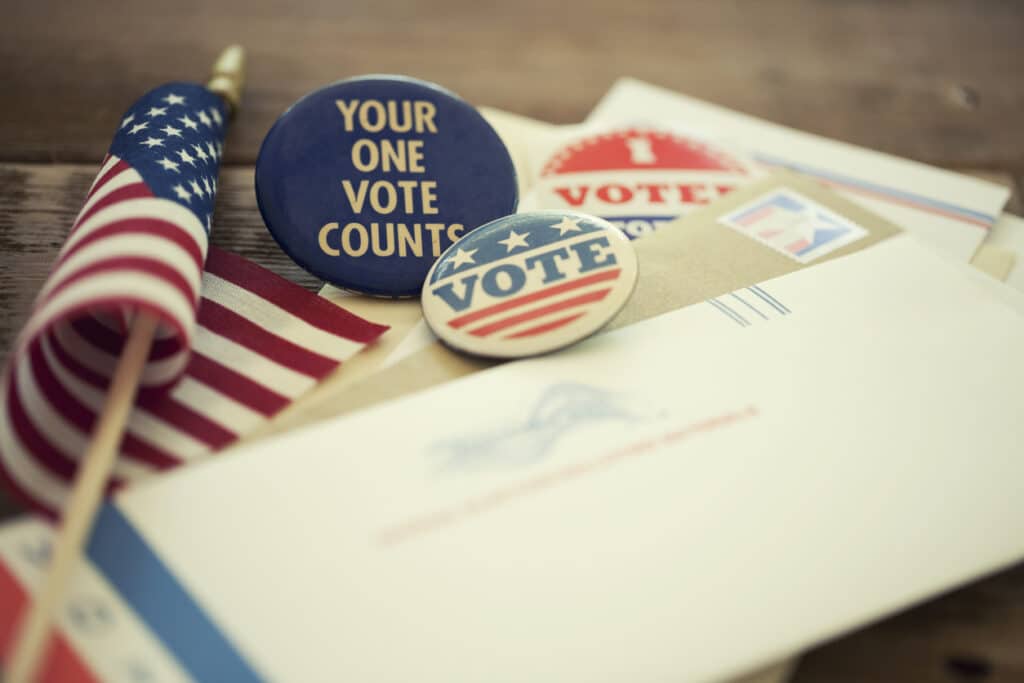Voting Abroad as a US Citizen (2024)

For millions of Americans living abroad, voting in US elections can seem complicated and confusing. But voting from overseas is easier than you might think. Here’s how to vote as an American living abroad.
Eligibility for Voting Abroad
US citizens living outside of the country have the same right to vote in federal elections as anyone living within the United States. That means that if you are a US citizen aged 18 or older, you are eligible to vote for federal offices such as presidents, senators, and representatives. This is true regardless of:
- Whether you have a residence in the US
- How long you have lived abroad
- Whether or not you intend to ever return to the US
- How long ago you last voted—or whether you have ever voted before at all
Make your voice heard in the upcoming Presidential election. Download our free guide for the in-depth steps it takes to vote while overseas.

Absentee Voting Basics
If you’re an American citizen living abroad, you will need to vote using an absentee ballot. This process involves requesting, receiving, and submitting a ballot—usually by mail or electronically, depending on state regulations.
Voting abroad just takes three easy steps:
- Register to vote.
- Request an absentee ballot.
- When your ballot arrives, fill it out and send it in.
1. Registering to Vote
In order to vote from abroad, you will have to be registered with local election officials in the state of your voting residence. In most cases, that will be whatever state you last lived in. You may also be able to use the address linked to a valid driver’s license or state-issued ID. If you’ve never lived in the US, you might be able to use the address of a parent or other relative who is a US citizen.
To register, use the Federal Post Card Application (FPCA). You can find the FPCA on several websites, such as:
- Federal Voting Assistance Program (FVAP)
- Overseas Vote Foundation
- VoteFromAbroad.org (Despite being run by Democrats Abroad, this is a nonpartisan site.)
All three sites make it as easy as possible to understand and complete the form, so don’t expect a hassle.
2. Requesting an Absentee Ballot
Once you’ve registered to vote, you will have to request an absentee ballot. You will do this using the FPCA as well. Once your application is approved, your name will be put on a list of voters to receive absentee ballots.
Many states require you to be registered at least a month before election day, so don’t delay. That said, even if it’s too late to submit an FPCA before the election, don’t worry. You haven’t missed your chance. The Federal Write-in Absentee Ballot (FWAB) is a backup option also available on the FVAP website. (More info below.)
3. Voting abroad and Returning Your Ballot
After receiving your absentee ballot, complete it as quickly as possible. Then, you have a few options for returning your completed ballot:
- Online, fax, or email: Some states let you submit your completed ballot electronically. Consult the Voting Assistance Guide for options in your state.
- Local mail: If you’re able, mail your ballot with appropriate international postage.
- Express Courier Service: If you don’t have much time or the standard mail service is unreliable, you can use professional courier services such as DHL, UPS, or FedEx at your own expense.
- US Embassy Diplomatic Pouch: You can mail ballot requests and completed ballots from any US embassy or consulate. Simply address the package to the relevant election officials and mail it with sufficient US postage. (You can get a postage-paid envelope from the FVAP website.)
Whichever method you choose, make sure you send it to the appropriate local election officials in time to meet your state’s deadline.
And that’s all it takes. Congratulations! Your vote is cast.
Using a Federal Write-in Absentee Ballot (FWAB)
If you haven’t received your absentee ballot by 30 days before the election, you’ll want to request the Federal Write-in Absentee Ballot (FWAB) mentioned above. You can use the FWAB as your ballot. Just write in your preferred candidates and send it to the local election officials in your registered state.
However, if your regular absentee ballot arrives after you’ve submitted an FWAB, go ahead and complete and return that, too. Some states only count your FWAB if your regular ballot doesn’t reach them by their deadline. Submitting both will not disqualify your vote or cast two votes in your name.
Verifying Your Registration
Some states require annual registration or have specific rules for citizens voting from abroad. It’s recommended to verify your voter registration status and absentee ballot request before each election cycle.
If you aren’t sure about your registration status, the FVAP website has a directory of state voter registration verification websites. You can also contact local election officials directly.
Voting Abroad and Your Taxes
Voting in federal races does not impact your federal or state tax liability. However, voting in state or local elections might. Some states allow US citizens to vote in state or local races while living abroad, but they use your vote as evidence of legal residency, and you could end up owing additional income taxes at the state level.
Make Your Voice Heard from Abroad
As a US citizen living overseas, your vote counts. If you still have questions, we’d be happy to answer them. At Greenback Expat Tax Services, we are committed to making your overseas life as easy and uncomplicated as possible.
Contact us today, and we’ll be happy to help you in any way we can.
When you live in the US, tax day is simple: April 15th! When you move abroad, it’s not so straightforward! Learn about all the expat deadlines and extensions you need to know to file.



